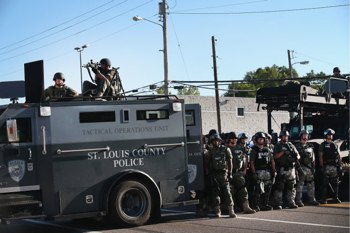Chris Lehmann challenged us (EduBloggers) last week to join the conversation about the police shooting of an 18 year old African-American man in Ferguson, Missouri and militarized posturing of law enforcement against the resulting protests. To be honest, I was not fully aware of the situation, too focused on getting my daughter ready to return to college and establishing a second residence to be closer to my and my wife’s parents.
I’ll agree wholeheartedly with all of Chris’ sentiments here, here and here, and would expound on them if I could. But, as a white, anglo saxon, protestant, eighth generation American, whose grandfather’s grandfather probably owned slaves, I honestly do not feel worthy to ardently express righteous sympathy with what I would characterize as second Americans. White man’s guilt?
I would like to ask a different question, though – and not as an attempt to distract us from a conversation about the unfulfilled promises (myths) of the American Dream. I ask this alternate question because I believe that there is another struggle happening here, one that possibly goes back to the beginnings of this country.
Looking at the picture to the right, I do not see how anyone could disagree with calling this a militarized police presence. But where did all that military hardware come from? Who bought it? ..and why? ..and Who got paid for it?

If we agree that one reason for learning (being taught) history is to avoid making its mistakes1, then here might be a useful starting question, “What were the historical mistakes that led to the situation of this picture?”
This could go almost anywhere in human history, of course, and why should formal learning experiences be limited (by testable standards)? But that’s a different issue — maybe.
We might, for instance, go no further than a little more than a decade ago, when 19 mostly Saudi Arabian terrorists, attacked the United States at it’s heart, New York City. Those 19 mostly Saudi Arabian men, using our own technology against us, were effective nearly beyond anyone’s imagination.
Our response was to make war in Afghanistan and Iraq and declare war on terror, establishing the Department of Homeland Security. Although little else happened here, local police forces still find themselves armed for terror both from without and within. ..And you know what they say about a hammer.2
I would suggest that we responsibly and effectively teach history to avoid its mistakes, but also as a guard against having history re-written for us.
I will close here by suggesting that we ask students utilize contemporary literacy skills and do what Deep Throat3 said, “Follow the Money.”
1 A paraphrasing of George Santayana’s quote, “Those who cannot remember the past are condemned to repeat it.“Santayana, G. (1905). The life of reason. Project Gutenberg. Retrieved from http://www.gutenberg.org/ebooks/15000
2 The Law of the Instrument, or as Abraham Maslow said in 1966, “I suppose it is tempting, if the only tool you have is a hammer, to treat everything as if it were a nail.“
3 Deep Throat is the pseudonym given to the secret informant who provided information toBob Woodward and Carl Bernstein of The Washington Post in 1972 about the involvement of United States President Richard Nixon‘s administration in what came to be known as the Watergate scandal.

As a military spouse and teacher at a department of defense school, this article hits close to home. Through the money and investment we are spending in the military, are we simply repeating history, or are we finding new solutions to problems?
It is critcal to look at history to discover why people are willing to spend money on certain issues. As we do so, it is critical to look at all the different perspectives in order to find better solutions for our future. For example, when we look at the history behind military funding after 9/11, it is critical to also look at the history beforehand as well. What caused those Saudi Arabian men to attack New York City and are there ways we could have prevented the hatred from growing so strong? One of the best history teachers I had was careful to teach from a variety of perspectives for example, he encouraged us to study World War II from the perspectives of Japanese civilians or German soldiers to gain a more comprehensive view.
While we also encourage our students to study history to understand how it affects the present situations in which we find ourselves, it is also imperative to discuss with them the present circumstances that will affect the future. In looking at Ferguson, we should discuss how it will affect racial tensions in our nation and perspectives on the police force. We should also discuss how we can work to make changes in future events that may result from these situations. For example, after the Dallas shootings and protests that followed, we see both despair and hope. There is increased hatred and animosity, but also a greater awareness of racial inequality that has been hidden for far too long. This is where we have the choice to work towards hatred and war or peace and hope. It is important to empower students within the school system with the understanding and responsibility of making a difference in these situations.